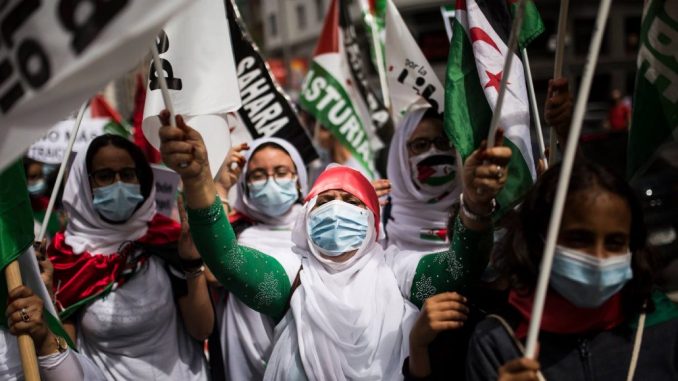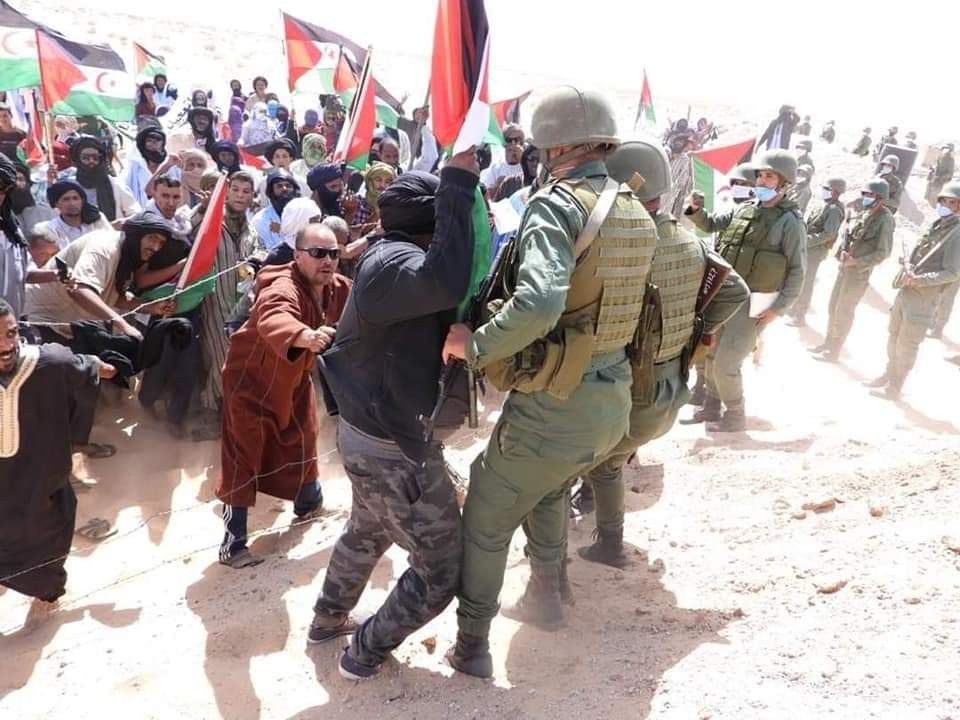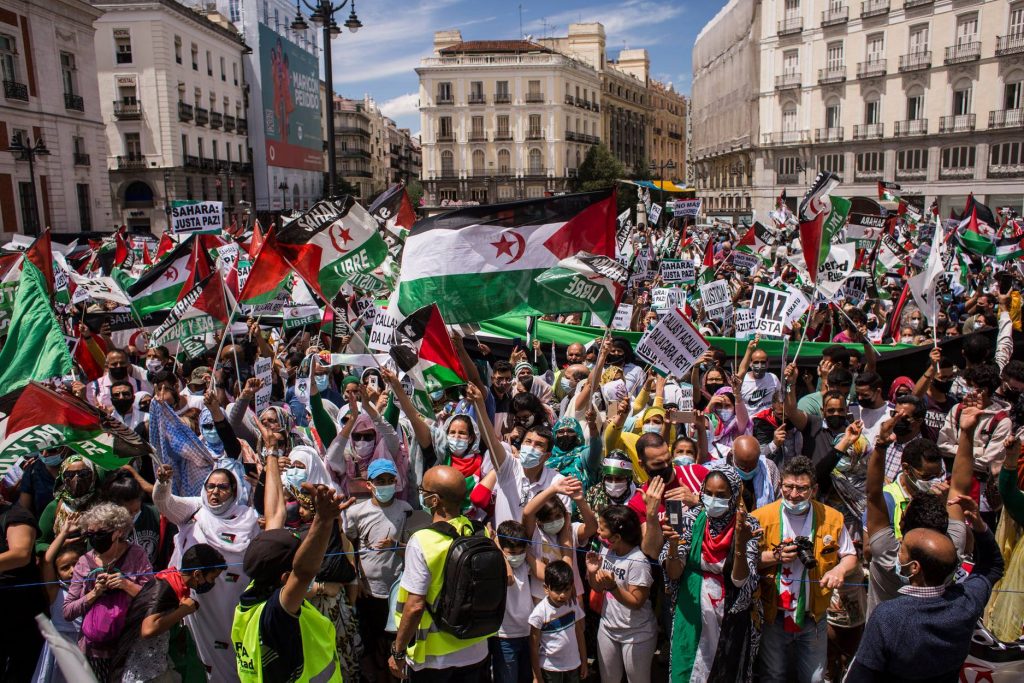
By Vicente Gaynor
Thousands of people joined the March for the Liberation of the Saharawi People that culminated in Madrid on June 19. The demonstration took place in the context of the offensive that Morocco has undertaken against the Saharawi people in the last period.
Western Sahara was the last European colony in Africa. Spain only abandoned it in 1975, but did so in agreement with Morocco and Mauritania, who immediately occupied the country. But the Saharawi people, who were already fighting against Spanish colonialism, took up arms against the new invaders.
In 1976, the Polisario Front, which had been founded two years earlier in the struggle against Spain, proclaimed the Sahrawi Arab Democratic Republic. Its forces defeated the Mauritanian invaders in 1979, but the war against Morocco would continue until 1991, when a UN-mediated ceasefire was signed. The agreement was accepted on the basis of a promise to organize a self-determination referendum that was never held. The Moroccan occupation of Western Sahara is brutal. Since 1981, the 2,500 km wall of shame that Morocco erected has separated occupied Sahara from the rest of the country. The half million Sahrawis who live in the occupied territory suffer a bloody dictatorship that represses, tortures and murders with impunity. Another 100,000 Sahrawis live in refugee camps under inhuman conditions in the Algerian desert. And thousands live in exile abroad, many of them in Spain.
From its base in Algeria, the Polisario governs the unoccupied territory in the east of the country and a narrow outlet to the sea, next to the Mauritanian border, where the Guerguerat pass is located.
The Sahrawi Arab Democratic Republic has achieved the recognition of 80 countries and the African Union, but the Moroccan occupation rests on its political and trade agreements with Spain and the European Union to consolidate its occupation and plunder of Western Saharan resources.
Morocco is the world’s third largest exporter of phosphate, behind only the United States and China. The ore is extracted from mines in occupied Sahara, and major European companies such as Simens provide power and logistics to those mines. In turn, Morocco is one of the main partners of Spanish fishing companies, but more than 80% of Moroccan fish imported by Spain comes from Sahrawi waters.
However, this status quo has begun to fall apart. The Arab Spring and then the wave of rebellions that have shaken the world since 2019, particularly the one Algerian one, radicalized a new generation of young Sahrawis. This vanguard provoked a change in the Polisario’s policy, abandoning the failed confidence in the UN negotiations, and launched a new offensive against the occupation.
In October of 2020, that youth led a mobilization against Morocco’s continued violation of the terms of the 1991 cease-fire by exporting plundered goods through the Saharawi crossing of El Guerguerat, and established a blockade of that passage. In November, the Moroccan army repressed the protesters, leading the Polisario Front to consider the ceasefire broken and declare a state of war against the Kingdom of Morocco and its occupying forces.

Faced with a new Saharawi uprising, Morocco undertook a new counteroffensive to try to reaffirm its colonial occupation. In December, it succeeded in getting then-US President Donald Trump to recognize Moroccan “sovereignty” over Western Sahara. In return, Morocco established full diplomatic relations with Israel, becoming the fourth Arab country to do so. A certain irony cannot be denied in the mutual recognition of the two colonial forces, which brutally keep two oppressed peoples in similar conditions.
Morocco expected the United States’ recognition to have a domino effect, particularly in Europe. But European governments have preferred to maintain the silent complicity that has allowed them all these years to do business and profit from the Moroccan occupation of the Sahara without politically exposing themselves to the permanent violation of UN resolutions.
Morocco’s need to strengthen its occupation in the face of the Sahrawi uprising has led to growing friction with Spain and other European countries. In March, Morocco suspended diplomatic relations with Germany due to “pofound misunderstandings” of “fundamental issues,” since the German delegation to the UN had stated that the US recognition of Moroccan sovereignty over the Sahara was illegal and the issue should be resolved within the frameworks established by the UN.
On May 18, in response to the hospitalization with Covid-19 of the General Secretary of the Polisario Front Brahim Gali in a hospital in Spain, Morocco opened its border controls with the Spanish enclave of Ceuta. Some 5000 immigrants crossed trying to enter Europe, generating a political crisis in the Spanish government.
Behind these frictions is the precariousness of EU-Moroccan economic agreements, which are threatened by the Sahrawi uprising. In 2016 and 2018, the Court of Justice of the European Union issued judgments that, after establishing that Western Sahara is not part of Morocco, determined that agreements between the EU and Morocco cannot be applied to Western Sahara.
Due to pressure from Morocco, economic convenience of the European countries, and the complicity of the UN itself, the EU Council signed new agreements with Morocco on fishing and the importation of agricultural and fishing products, which explicitly included Western Sahara. The Polisario Front has filed a lawsuit against the Council that the EU Court is evaluating and is expected to rule on reaffirming its previous rulings against the new agreements.
The massive March for the Freedom of the Saharawi People that crossed the Spanish territory from Cadiz to Madrid during weeks and filled the Puerta de Sol on June 19 took place in this context, and vindicates the offensive that the Saharawi people have undertaken in the last few months with its youth at the head.

For many years, the world ignored the terrible Moroccan occupation of the Sahara and the suffering of its people, Morocco was able to plunder Sahrawi resources, Europe was able to profit from them and the UN was able to turn a blind eye. Since the Sahrawi people stood their ground in El Guerguerat and declared war on the colonial occupation, all of that has become more difficult.
The heroic struggle of the Sahrawi people for their self-determination emerged from the shadows and burst onto the world stage. It is an indispensable task for every revolutionary to surround it with solidarity and provide it with all the internationalist support it needs to triumph. The International Socialist League has been promoting an international campaign of solidarity with this struggle and this uprising since it began. Today we double down on our commitment to sustain a permanent campaign against the Moroccan occupation, for the independence of Western Sahara, its recognition as a sovereign country by the governments of the world and for the self-determination of its people.








